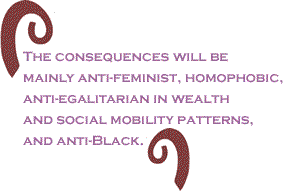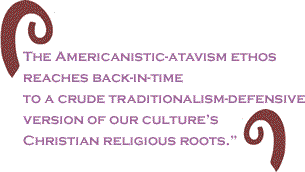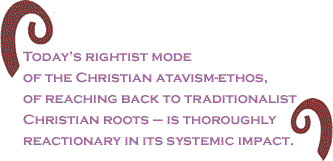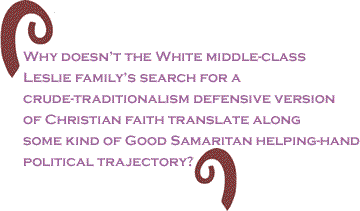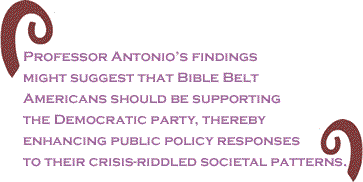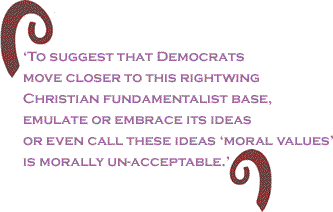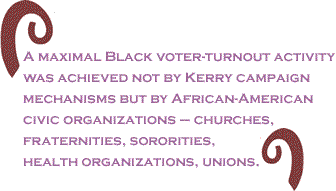
|
|||||||||||||||||||||
 |
|||||||||||||||||||||
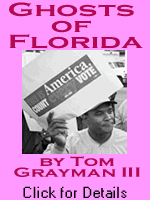 |
|||||||||||||||||||||
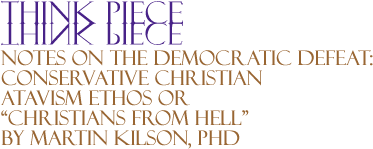 |
||||||||||||||||||||||||||||||||||||
According to the Washington Post columnist David Broder’s analysis of exit polls in the 2004 Presidential Elections, “about 22 percent of voters were white evangelical or born-again Christians, three-quarters of whom went for Bush.” This kind of White conservative Christian voting for the Republican party’s presidential candidate translated into 30% of Bush’s total national vote. As the editors of The Black Commentator observed in their November 4, 2004 issue, this electorally crucial White conservative 30% of Bush’s national vote is a kind of electoral “militia for Karl Rove and other Bush [political] commandants [who scare] the hell out of many of the 44 percent of white folks who didn’t vote for Bush.” Put more bluntly, the editors of The Black Commentator culturally characterize the Republican party’s core White voters as “Christians from Hell.” While this cultural characterization of the Republican Party’s core White conservative Christian voters is more graphic than my own cultural understanding of such voters, viewing them as “Christians from Hell” is analytically apt from an ethnographic vantage point. However, in my preferred ethnographic characterization of Bush voters, they operate out of what I call an “Americanistic-atavism ethos”. What is basic to this Americanistic-atavism ethos is that it reaches back-in-time to a crude traditionalism-defensive version of our culture’s Christian religious roots, thereby seeking protection against the cultural/societal complexity and trauma that define so much of the post-industrial and post-Cold War world we live in today. We owe our general understanding of the atavism-ethos to anthropologists who have studied pre-literate kinship societies. To ethnographic analysts like Anthony Wallace, Godfrey Wilson, Monica Wilson, A.L. Epstein, Max Gluckman, and others whose research among Oceania and African peoples (see, e.g., Anthony Wallace’s The Trumpets Shall Sound, Monica Wilson’s Reaction to Conquest, Bengt Sundkler’s Bantu Prophets) demonstrated how resort to retrieving ancient or traditionalist norms and values enabled crisis-riddled and trauma-riddled kinship societies to revitalize themselves. Which is to say, to regain a sense of cultural and thus personal efficacy. Of course, the duration or stability of such atavistic-ethos revitalization is quite another matter, for the “new order” was not often particularly viable, resulting , as Max Gluckman’s studies of southeast African tribes demonstrated, in another atavist-inspired revitalization thrust, and then another, and another, ad infinitum.
Other analysts facilitate our more modern understanding of the atavism-ethos in Western nation-state societies from the 17th century onward. For this, we turn to historians like the Harvard economic historian Joseph Schumpeter, the British social historians Christopher Hill and Lawrence Stone, among others. Studies of the atavism-ethos in Western nation-state societies suggest that the societal revitalization role can be either regressive (militarist, dictatorial, fascist) or progressive (culture-experimental, theocratic-reformist, political-reformist). Uses Of Modern Christian Atavism Ethos: Liberal Examples That small group of White-Anglo-Saxon-Protestant
religious denominations among Presbyterians, Congregationalists,
Quakers, and Universalists
who launched the great anti-slavery Abolitionist Movement in the early
1800s functioned along the lines of an atavism-ethos within Christianity,
a reaching-back-to-traditionalist-Christian roots in face of a monstrous
normative crisis. It was an atavism-ethos in behalf
Without the momentous Abolitionist Movement instance of the Christian atavism-ethos used as a culture-innovative revitalizing societal process in 19th century American society (along with, of course, the Civil War which Lincoln’s Union Army won), Negro slaves wouldn’t have been emancipated in 1865, and only God knows when that earth-shaking event would have taken place. Happily, from the early 1950s through the 1960s, our own era’s great Civil Rights Movement also involved a culture-innovative and humanitarian reaching-back-to-traditionalist-Christian inspiration. Thanks especially to Martin Luther King’s leadership and that of other 1950s Christian-inspired Southern Black clergy activists like the South Carolinian African Methodist Episcopal clergyman Reverend Joseph Armstrong DeLaine, whose courageous opposition to Southern racist practices was recently probed by the Vanderbilt University historian Dennis Dickerson. (See Dennis Dickerson, “’Reverend J.A. DeLaine, Civil Rights, and African Methodism,” The A.M.E. Church Review, July-September, 2003, pp. 47-62.) Within King’s Southern Christian Leadership Conference (SCLC), the culture-innovative reaching-back-to-traditionalist-Christian inspiration was calibrated through creative Christian-activist skills of inner-circle persons such as James Lawson, John Lewis, Andrew Young, L.D. Reddick, Bayard Rustin, Jesse Jackson, and others, calibrated in a way that gained Black Americans a small but genuine degree of White Americans’ support for our anti-racist, desegregation goals. Rightist Theocratic Atavism In 2004 Presidential Election Against the background of the skillful application
of a culture-innovative Christian atavism-ethos under Martin Luther
King’s As Princeton University philosophy scholar Cornel West informs us in his new book Democracy Matters: Winning the Fight Against Imperialism (Penguin Press, 2004), the crude traditionalism-defensive version of Christian atavism among White fundamentalist Christian circles today has stymied the culture-innovative and humanitarian version of Christian revitalization, amounting to what he calls a “Constantinian-type Christianity” that allies with the imperialist-minded, oligarchic, greed-riddled corporatist elites in American society. What Cornel West is telling us is that today’s rightist mode of the Christian atavism-ethos – of reaching-back-to-traditionalist-Christian roots – by Christian fundamentalist organizations and leaders (Jerry Falwell, Pat Robertson, etc.) is thoroughly reactionary in its systemic impact. It has assisted the strengthening of oligarchic and greed-ridden plutocratic patterns to a degree comparable to what prevailed in American society back in the Robber Baron or Gilded Age era from the 1870s through the 1920s. Happily for most White Americans, the crisis of the Great Depression combined with the lucky events of Roosevelt’s election in 1932 and three-time reelection turned our democracy toward something approximating a genuinely liberal organization of America’s socio-economic and political patterns, though regrettably and cynically cruel and rigid racist realities continued to oppress and torment the vast majority of African-American lives. World War II advanced America’s liberal patterns, and the post-war years from the Truman/Eisenhower administrations through the Kennedy/Johnson administrations did, too. But starting with Nixon’s Republican White House and especially Reagan and Bush I’s reign, a political oligarchic restoration of American corporatist power began to cast a deadening conservative shadow over the country, the seemingly benign feature of which – thanks to Reaganite ideological charm – aided a Republican electoral consolidation. Nothing I’ve read since the Democratic presidential candidate’s defeat in November relates the electoral effectiveness of today’s baffling pattern of an admixture of Christian fundamentalist atavism and oligarchic American corporatist power better than a news report carried in the Boston Globe the week after the election. Titled “For Evangelical Family, Bush’s Victory Due to Values, Prayer,” (Boston Globe, November 7, 2004), the article features a long interview with a middle-class White Protestant family in a suburban-type northern Ohio town named Sheffield Lake, whose male head earned $55,000 as an insurance salesman as of September 2001 when his company cut back jobs – including his. Today he earns $35,000 annually, an income derived from two jobs, one of which involves “delivering pizzas Friday and Saturday nights.” Cary Leslie’s family has three children (the oldest looks like 7 or 8 years of age), so Mrs. Leslie stays home.
Now, according to my old-fashioned leftist view of how politics in a 21st century democratic capitalist country operates in overall terms, I’d expect 29 year-old Cary Leslie to at best be some kind of Democratic Party voter and at worst some kind of moderate-to-liberal Republican. I can report that my old-fashioned progressive predilections regarding Cary Leslie’s politics were dead wrong! Here’s what he told the reporter, who did the article originally for the Washington Post:
This interview with the hard-scrabble middle-class Leslie family strikes me, in terms of their political consciousness and the rational-thinking side of their middle-class mindset, as just plain bizarre. As bizarre as the reporter for The Nation, Thomas Frank, found the Leslie-family type political consciousness prevailing on a state-wide basis in his native Kansas, brilliantly related in his book What’s The Matter With Kansas: How Conservatives Won the Heart of America (2004). Now, in regard to the grimness characterizing Cary Leslie’s current job and income situation, here’s what the Boston Globe reporter tells us:
Interface of Traditionalist-Defensive Christian Activism and Oligarchic Corporatism At the interface of traditionalist-defensive Christian activism and oligarchic corporatism in today’s America we can find the makings of a systemically reactionary American society on a scale that predates the Franklin Delano Roosevelt Era. Why doesn’t the White middle-class Leslie family’s search for a crude-traditionalism defensive version of Christian faith – their quest for answers to societal and cultural anxieties rife in today’s America – translate along some kind of Good Samaritan helping-hand political trajectory?
It is, of course, the fundamentalist Christian families’ (that Ohio Leslie family’s) resistance to a Good Samaritan helping-hand conception of the atavism-ethos in today’s anxiety-riddled American middle-class milieu that baffles Americans of liberal and progressive outlook. Our bafflement is, moreover, politically fundamental. For it is through their resistance to the Good Samaritan conception of the traditionalist Christian values that fundamentalist White Christians arrive at their stingy public policy assistance outlook on issues facing not only poor and working-class Americans but even middle-class Americans like themselves. This is what surprises Thomas Frank in his brilliant book What’s The Matter With Kansas, where he probes the electoral preference for a rightwing Republican party among the middle-class working White families of his home state. He argues that a large sector of White Americans (perhaps 30 to 40 % on the basis of 2004 election exit polls) suffer from what Marx called “false consciousness,” from a condition of real-world denial. And it is precisely this false-consciousness state of affairs that’s widespread among working-class and middle-class White Americans especially (far less so, happily, among African-Americans) that has been electorally manipulated with much success by the dominant rightist coalition within the Republican party. The “false consciousness” or real-world denial mindset that’s widespread among working-class and middle-class White Americans prevails in an unmistakably oligarchic and plutocratic delineated American society. In its June 2003 issue, the four-page bulletin The Hightower Lowdown, produced by former Texas Observer editor Jim Hightower, reported startling American income-gap data. Derived from Business Week, the data – shown in Table I – revealed a 400-to-l income ratio between the average top corporate executive, on the one hand, and the average-income American, on the other hand. In the words of The Hightower Lowdown: “The average top executive in our country grabs 400 times more in pay than the typical hourly employee in the same company.” Table I PAY GAP IN SELECTED COUNTRIES,
2000
Source: The Hightower Lowdown (June 2003).
Furthermore, within two years the top corporate ranks in the United States were earning more than 500 times the average American annual income of $35,000. This incredible state of affairs was reported in a January 25, 2004 New York Times column by Gretchen Morgenson, shown in Table II. Table II PAY GAP IN SELECTED COUNTRIES,
2004
Source: The New York Times (January 25, 2004). Note that in the next largest economies to the United States economy – Germany and Japan – nothing like the incredible income-gap state of affairs obtaining today in our country is permitted to prevail by public policy practices. Indeed, the morally obscene American wealth and income-gap pattern is not permitted in any Western European capitalist democracy – in no Scandinavian nation, not in Belgium, not in the Netherlands, not in Spain, not in Portugal. Nor in off-shoot European nations like New Zealand, Australia, and Canada, though a larger ratio is permitted in Latin American democracies of Mexico and Brazil. Gretchen Morgenson’s New York Times article is especially interesting because it reports the beginnings of efforts by liberal shareholders groups to challenge the morally obscene executive-rank skewed income gap and the economic rationale put forth in its defense. Of course, it is precisely the virtual absence of any thrust among millions of typical middle-class working American families awash in conservative Christian fundamentalism – and thoroughly agitated over America’s presumed loss of “moral values” – to question today’s wealth and income-gap pattern that causes so much bafflement for liberal and progressive elements. A bafflement that George W. Bush’s electoral victory over John Kerry in November compounded. In this connection, note the dismay expressed by the liberal New York Times African-American columnist Bob Herbert in a column titled “The White-Collar Blues,” published a year before November’s election (Times. December 29, 2003):
Critique of Pander-to-Christian-Fundamentalist Advice to Democrats In the wake of the Democratic presidential candidate’s defeat, few things have irked me more than columns in newspapers and magazines by leading liberal political commentators advising the Democratic Party to gain a greater electoral efficacy by pandering to White middle-class families like the Leslie family in Ohio. In the week or two following the November 2nd election, such pandering-to-White-fundamentalist-Christian voters was rampant. A pandering to millions of White Americans who prefer to wallow in a crude traditionalist-defensive Christian atavistic activism, that they believe to be a legitimate restoration of American “moral values.”
Immediately after the election, leading political commentators engaged in rampant pandering-to-White-fundamentalist-Christian voters – Nicholas Kristof in the New York Times, David Broder in the Washington Post, etc. On November 9 the New York Times reported that James Carville, a former strategist for Clinton, contributed a slick round-about way of advising the Democratic Party to cultivate White Christian fundamentalist voters, saying: “The purpose of a political party is to win elections, and we’re not doing that. I think we have to come grips with the fact that we are an opposition party right now and not a particularly effective one. I’m out of denial. Reality has hit.”
This kind of opportunistic liberal advice (pseudo-realist liberal advice actually – let’s-win-at-whatever-moral-cost liberal advice) in a period of systemic political tension is familiar to African-American leadership. After all, such opportunistic pseudo-realist liberal advice was rampant in Democratic Party leadership ranks when President Nixon’s Republican party initiated its “Southern strategy” from the 1968 election onward. That “Southern strategy” was, of course, Nixon’s smooth-racist appeal to racist-minded Southern Whites who formerly voted for the Democratic Party. Failing to prevent the Civil Rights Movement from gaining major federal desegregation legislation under the Kennedy/Johnson Democratic administrations, the majority of White Southerners followed Nixon’s smooth-racist appeal and abandoned the Democratic Party in droves, claiming of course that its “moral values” (“social values” was the lingo then) were no longer in line with the good old Americanistic Christian values held by the good White people of the South. From the 1972 Election onward, this was and remains the official cover-rhetoric for what I believe are significantly racist-skewed electoral preferences among a majority of White Southerners. Only two Southern Democratic presidential candidates since 1972 – Jimmy Carter and Bill Clinton – were able to gain election by putting a small electoral-dent in White Southerners’ racist-skewed electoral preferences, aided massively of course by African-American voters in the North and Mid-West and by Latino voters in Southwest and West. From Reagan’s reign to Bush I’s reign and now Bush II, today’s Christian-fundamentalist enhanced Republican party has skillfully and cynically refined Nixon’s “Southern strategy” – perhaps even “diversified" it with three African-American cabinet officials – and thus now easily dominates elections in the South. Another column carried in the Boston Globe (November 10, 2004) by a Religious Studies professor at Boston University, Stephen Prothero, also advised the Democratic Party on the need to fill the “moral values gap” in its electoral persona (he calls it the “God gap”), but Professor Prothero’s advice didn’t emit the tacky political opportunist fumes – and moral opportunist fumes – that I found so foul in similar advice to the Democratic Party from Nicholas Kristof, James Carville, and their ilk. I say this because toward the end of his column Professor Prothero refers to what I call a progressive case of the Christian atavism-ethos in American political history. To quote Prothero: “Black ministers have for centuries been drawing political lessons from the Old Testament prophets.” But following this reference to African-Americans’ progressive use of Christian activism Professor Prothero switches his gears to the right, so to speak, for he doesn’t go deep enough with the broader progressive meaning of the African-American case of culture-innovative use of the Christian atavism-ethos to launch the great Civil Rights Movement of the 1950s and 1960s. He doesn’t explicitly state that it represented a qualitatively different version of the Christian atavism-ethos in American political history, one that differed sharply from the crude culture-traditionalism defensive version employed by the Jerry Falwell-led and Pat Robertson-led Christian Right and its plutocratic power-class allies in President George Bush’s Republican party. Accordingly, at the heart of his article, titled “Democrats: Get Religion!” Prothero critiques Thomas Frank’s analysis of the successful electoral manipulation of Christian activism by the Christian Right and the Republican party among middle-class and working-class White Americans. Frank argues in What’s The Matter With Kansas that a large segment of working-class and middle-class White Americans are in a state of real-world denial regarding the oligarchic and plutocratic structure of wealth and opportunity in today’s America. In reply, Boston University Religious Studies Professor Stephen Prothero says, so what?:
Stephen Prothero’s seemingly Democratic Party-friendly advice to in effect “Jerry-Falwellize-or–Rightwing-Christianize-the-Democratic Party” rests on an implicit assumption that Prothero, and others like him who tender this advice, never candidly state. Namely, that Christian fundamentalist-prone Americans are benefiting presently from a rightwing-Christianized Republican party and will benefit further under a rightwing-Christianized Democratic Party. However, it is apparent from the empirical evidence on the status of societal and cultural circumstances of Americans residing in the Southern Bible Belt that the political dominance of a rightwing-Christianized Republican party has not resulted in significant family-friendly or people-friendly outcomes. An article by University of Connecticut Professor William D’Antonio in the Boston Globe (October 31, 2004) titled “Walking the Walk on Family Values,” presented fascinating counter-intuitive data on societal and cultural circumstances of Bible Belt Americans:
At one level, Professor Antonio’s findings can be read as evidence suggesting the special appeal of crude traditionalism-defensive fundamentalist Christian activism among Bible Belt Americans, evidence relating to their greater degree of crisis-riddled societal patterns. At another level, Professor Antonio’s findings might suggest that Bible Belt Americans should, as Thomas Frank argues in his study of conservative Whites in Kansas, be supporting the Democratic Party, thereby enhancing public policy responses to their crisis-riddled societal patterns. However, it is evident that the skillful ideological manipulation of fundamentalist Christian activism among at least 30% of White American voters (combined, I believe, with latent neo-racist predilections) effectively counters and forestalls liberal or Democratic Party electoral outcomes among White Bible Belt Americans. It is, then, this situation that prevailed in the 2004 Presidential Election. Conclusion: What To Do?
There are several points-of-departure from which to reflect usefully on the question, What To Do? First, it is important to have an historically viable understanding of the kind of systemic milieu that defines today’s crisis-riddled American society. For this understanding, I turn to a set of astute formulations in a recent issue of The Nation (December 20, 2004) by sociologist Troy Duster, a professor at New York University. Professor Duster commences his insights into the core historical meaning of the 2004 presidential election with this stunning observation:
Duster then offers an important comparative historical understanding of how capitalist elites in Europe during the 1920s and 1930s easily allied with rightist social and culture forces in order to reinforce their hegemony against liberal and leftist trends. For Duster, those pre-World War II rightist political patterns in Europe were not “inexplicable political aberrations that could not happen here. We easily forget that those rightwing governments had strong electoral showings….” The implication here is that today’s cynically oligarchic and greed-driven American corporate mechanisms (Enron, World.Com, Tyco, etc.) are capable of fashioning a smiling-face American autocracy under the cover of a democratic façade, an issue Noam Chomsky has brilliantly enlightened us on. Accordingly, Duster offers a prescriptive conclusion in regard to the Democratic Party’s defeat in the November election that differs fundamentally from the pseudo-realist liberal advice offered by James Carville and co. – the let’s-win-at-whatever-moral-cost advice – a prescriptive conclusion that I also endorse. Namely, reject John Carville’s advice to the Democratic Party. As Troy Duster puts it: “To suggest that Democrats move closer to this [rightwing Christian fundamentalist] base, emulate or embrace its ideas or even call these ideas ‘moral values’ is morally un-acceptable.” There’s another facet of the need for a viable historical understanding of an effective future response by the Democratic Party to the November election defeat, a facet formulated by the Columbia University historian Eric Foner in the same issue of The Nation. Exhorting “progressives …not to succumb to hopelessness” as a response to election defeat, Eric Foner tells the Democrats to learn a lesson from the progressive tradition of rebounding from defeat. “The left must do what it has always done in American history,” Professor Foner proposes, “what Frederick Douglass and Susan B. Anthony and Eugene Debs did: stake out a clear position in favor of social and economic justice, at home and abroad, and articulate it as clearly and forcefully as possible.” Having retrieved this progressive political history lesson, Eric Foner draws a present-day operational strategy from it for the Democratic Party:
A second progressive point-of-departure for arriving at answers to the issue of What To Do? relates to the character of equity in living standards, social mobility opportunity, and wealth in today’s oligarchic corporatist-skewed American society. An interesting post-November election perspective from this point-of-departure is provided by the progressive economic analyst Robert Kuttner, editor of American Prospect. Writing in a column for the Boston Globe, Kuttner presents a version of what I’d call a “neo-Clintonized” electoral strategy, which is to say a voter-appeal strategy that draws upon Bill Clinton’s working people-sensitive style and demeanor reinforced with a genuine populist public policy agenda. As Kuttner saw the November election:
Expressing his dismay at joining-the-moral-values-bandwagon advice to the Democratic Party from what I call pseudo-realist liberals like James Carville, Kuttner demurs vigorously. American politics at its core is “still a tale of two Americas,” Kuttner retorts, “and Democrats need to tell it more convincingly or cultural resentments will continue to crowd out economic ones. Some bewildered Democrats have been telling each other that next time they need to get religion. Not so. Without their economic souls, they won’t have prayer.” A philosophically based post-November election perspective on the character of equity in living standards, social mobility opportunity, and wealth in today’s oligarchic corporatist-skewed American society is offered by the Princeton University philosopher Richard Rorty in a recent election post-mortem issue of The Nation (December 20, 2004). Interestingly enough, the great Princeton philosopher Rorty is skeptical about a Democratic Party appeal that places too much emphasis upon the Good Samaritan side of Christian activism when challenging the fundamentalist Christian Right. “The sort of people who make up Bush’s base,” says Rorty, “cannot be won over by insisting that Christianity mandates concern for the poor, and that Bush has shown none. For most fundamentalist evangelicals think that poverty is a punishment either for insufficient gumption or for failure to establish the sort of personal relationship to Jesus that insures worldly success.”
The operational and electoral lesson that Rorty draws from this philosophical understanding of the Christian Right dynamic in American politics is, I think, absolutely crucial to future Democratic Party strategy. For one thing, Rorty exhorts the Democrats not “to start sounding more pious. They cannot give up on abortion rights and gay rights without alienating many blue voters….” Which is to say, Rorty abhors the widespread advice from pseudo-realists among Democrats to scramble to the center-right politically. As Richard Rorty puts it:
A final progressive point-of-departure for arriving at answers to the issue of What To Do? relates to the status of the African-American voter bloc in the November election. Clearly and most certainly, Democratic candidate John Kerry’s mustering of 252 Electoral College votes in the 2004 Presidential Election (compared to George W. Bush’s 286) benefited significantly from the backing of 89% of Black voters. Only Jewish voters approximated the massive Black voter support for Kerry, with 77% of the Jewish vote backing Kerry, and the Latino voter bloc gave Kerry 56% of their votes. However, in the states of Florida and Ohio where the Bush campaign and the Republican National Committee maximized their voter-turnout mechanism, the Kerry campaign and the Democratic National Committee (DNC) functioned significantly below maximal voter-turnout capability. (Incidentally, in the case of Pennsylvania, a maximal Black voter-turnout activity was achieved not by Kerry campaign mechanisms but by African-American civic organizations – churches, fraternities, sororities, health organizations, unions, etc. – saving that state for Kerry, who won it by 2.5%). This point was expressed fervently by the political columnist for The Nation, David Corn, in that journal’s issue of November 22, 2004. In his column titled “Dark Days Ahead,” David Corn concluded his post-mortem appraisal of the Democratic Party’s defeat as follows:
Insofar as the official Bush victory margin in Ohio stands presently at 119,000 (see New York Times, December 7, 2004), it is reasonable to assume that had the Kerry campaign and the DNC mounted a maximal Black voter-turnout mechanism in Ohio urban districts, Black votes were capable of carrying Ohio for Kerry. Furthermore, the Kerry campaign compounded the chances of Kerry’s defeat when it and the DNC failed to mount a maximal Latino voter-turnout mechanism in New Mexico, Nevada, and Colorado, states that Bush carried but not overwhelmingly – viz., 6,000 Bush margin in New Mexico, 21,500 in Nevada, and 100,000 in Colorado. The Latino political commentator Jorge Ramos observed in The Nation (December 20, 2004) that “the election was decided by Latino voters in Colorado, Nevada, and New Mexico,” an outcome Ramos believed was due to major weaknesses in the Kerry campaign. In particular, the Democrats, says Ramos, “de-emphasize[d] the importance of the Hispanic vote…to concentrate their efforts and money in non-Hispanic states. …Kerry gave only twenty-five interviews to the Spanish-language media…. The consequences of these errors are plain to see: Bush got 44 percent of the Hispanic vote and Kerry 53 percent, significantly less than the 62 percent won by Al Gore four years before.” Now in regard to Jorge Ramos’ comment that in failing to put effective emphasis on Latino voters the Kerry campaign instead turned to “non-Hispanic states,” this was true but within those “non-Hispanic states” the Kerry campaign and the DNC did not effectively maximize Black voter-turnout activity. What is worse, the Kerry campaign’s failure to maximize Black voter-turnout in Ohio, Florida, and Pennsylvania, could have been avoided had a seemingly pathological pattern of oligarchic posturing by Kerry campaign and DNC leadership ranks toward key African-American voter mobilization organizations not taken place. The sorry tale of Kerry campaign/DNC arrogant posturing toward Black voter mobilization organizations like the 84-member National Coalition on Black Civic Participation (NCBCP) – skillfully led by Patricia Ford, former executive vice president of the Service Employees International Union (SEIU) – and the Unity ’04 umbrella of organizations, co-chaired by the Urban League President Marc Morial, Dorothy Height, of the National Council of Negro Women, and University of Maryland political scientist Ronald Walters, was first reported on The Black Commentator website, October 14, 2004. The downside outcome was the refusal of leading DNC figures like Steve Rosenthal, Harold Ickes, and Terry McAuliffe to allocate the required finances for the Black voter mobilization organizations like NCBCP and Unity ’04 to perform the task they are so very skillful at. The Kerry campaign/DNC oligarchic-minded leaders preferred doling out inadequate funds for Black voter-turnout activity through Kerry campaign/DNC hand-picked African-American operatives, a leading figure among whom was Ben Johnson, a Democratic National Committeeman. In September 2004, the University of Maryland political scientist and brilliant political tactician Ronald Walters sent the Kerry campaign/DNC officialdom a stinging critique of this 21st century version of “plantation politics,” letting the Kerry campaign/DNC ranks know in no–uncertain-terms that no African-American leadership group worth-its-salt will today tolerate such a situation:
Let me conclude these reflections on the 2004 Presidential
Election with some observations in regard to several long-run political
dynamics
relating to the Democratic Party candidate’s defeat. One observation,
by the political savvy editors of The Black Commentator, relates
to the possible implications for liberal political interests of African-Americans
stemming from the sizable Latino vote for Bush. As the editors
of
Another pregnant concluding observation on the
implications of the Democratic Party defeat for America in general
and for African-Americans
in particular also comes from the editors of
Dr. Martin Kilson is Frank G. Thomson Professor of Government Emeritus at Harvard University, and was the first African American to be granted full tenure at the institution, in 1968. His two-volume study, "The Making of Black Intellectuals," a 22-year labor of love, will be published next year. |
||||||||||||||||||||||||||||||||||||
| December 16 2004 Issue 118 |
|||||||||
|
|||||||||
|
|
|||||||||
| Printer Friendly Version | |||||||||
 |
|||||||||
 |
|||||||||
 |
|||||||||
| |
|||||||||
| |
|||||||||





















